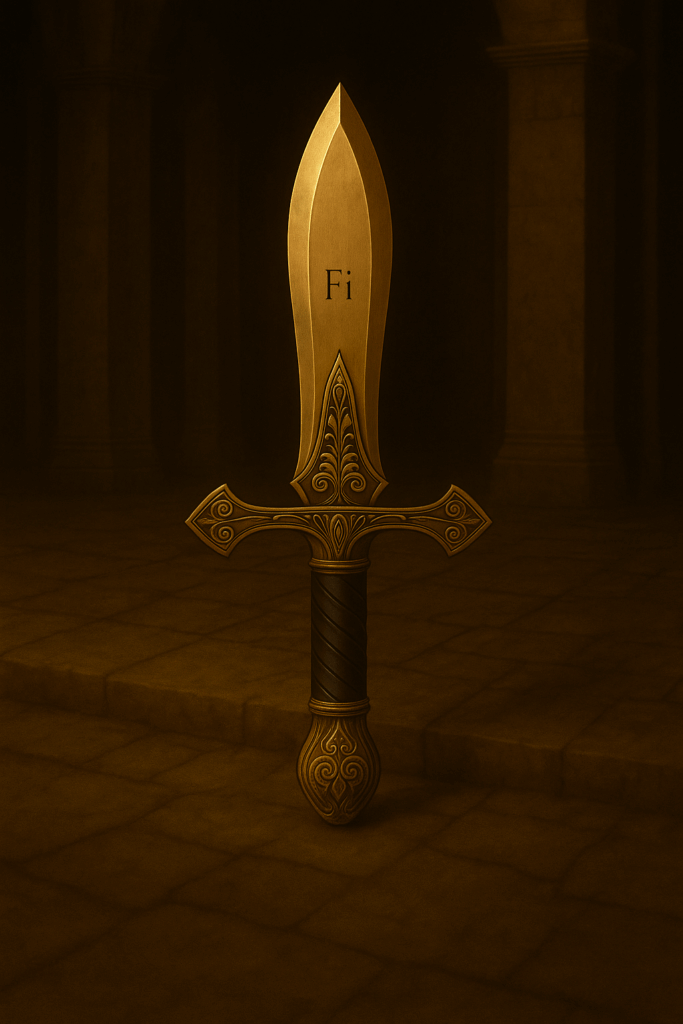
The Symbolism of the Dagger
When we imagine Introverted Feeling (Fi) as an ancient weapon, the dagger is its most fitting form. Unlike the war hammer of Te or the broad shield of Si, the dagger is personal, intimate, and close to the heart. It symbolizes deep conviction, moral authenticity, and inner strength.
The dagger in the image is ornate yet restrained, with a leaf-shaped blade and intricate engravings on its hilt. It is not a weapon meant for dominance or spectacle but one carried close, representing the quiet certainty of Fi. Just as the dagger protects and strikes with precision at close range, Fi guards its inner values and acts when those values are called into question.
Why the Dagger Captures the Essence of Fi
Fi is inwardly focused, concerned with integrity, authenticity, and the alignment of actions with deeply held personal values. The dagger embodies these qualities:
- Intimacy and Precision – Unlike large battlefield weapons, a dagger is used up close, reflecting Fi’s personal and internalized approach to truth.
- Authentic Craftsmanship – Every dagger is unique, crafted with meaning. Fi builds personal systems of ethics that may not follow the majority but hold deep significance.
- Protection of the Heart – A dagger is easily concealed, drawn only when needed. Similarly, Fi often remains private until a core value is threatened.
- Quiet Strength – Though small, a dagger can be lethal in skilled hands. Fi is not loud but is unwavering and powerful when its convictions are challenged.
The dagger’s symbolism shows that strength is not always loud or external. Sometimes it lies in silent determination.
Fi in Action – The Dagger as a Cognitive Tool
Think about how a dagger is used. It is not a weapon for broad, sweeping gestures. Instead, it is for decisive, intentional strikes. This mirrors how Fi operates in real life:
- Guarding Core Values – Just as a dagger defends its wielder up close, Fi defends the principles and beliefs closest to one’s identity.
- Acting with Authenticity – Every movement with a dagger must be deliberate. Fi ensures actions align with personal truths.
- Remaining Subtle but Strong – A dagger is easily overlooked compared to swords or spears, but it delivers decisive outcomes. Fi is quiet in demeanor but firm in conviction.
- Responding When Necessary – A dagger is not brandished without cause. Fi does not impose values outwardly but responds strongly when authenticity is at stake.
In both battle and symbolism, the dagger reflects Fi’s deep, personal, and unwavering connection to inner truth.
The Stone Hall – Fi’s Inner World
In the image, the dagger rests upright in a solemn stone hall. The hall represents Fi’s inward sanctuary—a private chamber where moral truths and values are carefully examined.
The candlelit setting reflects Fi’s warmth and sincerity, contrasting with the colder grandeur of weapons like Te’s hammer. The dagger’s placement on an altar-like surface suggests reverence: Fi treats its values as sacred, not to be compromised lightly.
Where other functions thrive in outward systems or external validation, Fi finds its strength in the quiet halls of inner reflection, choosing authenticity over conformity.
How the Dagger Reflects Different Carriers of Fi
The dagger remains a dagger, but its use varies depending on who wields it. Fi expresses itself differently depending on personality structure:
- Carried as a Primary Tool: The dagger is central, guiding every action with authenticity. Its bearer becomes a guardian of values and truth.
- Carried as Support: The dagger balances other weapons, providing moral guidance to more outward or logical functions.
- Carried in the Shadows: When neglected, the dagger may feel like a hidden burden, leading to hypersensitivity or struggles with self-expression.
Regardless of its place, the dagger reminds us that Fi is always personal, always authentic, and always tied to deeply held conviction.
Lessons the Dagger of Fi Teaches Us
The dagger is not only a weapon but a lesson in integrity. Its presence teaches us how to live with authenticity and inner strength. Lessons from the dagger of Fi include:
- Stay True to Your Values – Never compromise on what matters most, even if it goes against the crowd.
- Choose Precision – Like the dagger, act deliberately and authentically instead of spreading energy too thin.
- Defend, Don’t Dominate – Fi teaches us that true strength is in defense of principles, not in imposing them on others.
- Treasure Authentic Connections – The dagger symbolizes intimacy; Fi values genuine bonds over shallow approval.
- Respect the Quiet – Just as the dagger is subtle yet powerful, Fi reminds us that power often resides in stillness and sincerity.
The dagger teaches that authenticity is not weakness—it is the truest form of power.
Quotes That Reflect the Dagger of Fi
“Integrity is doing the right thing, even when no one is watching.” – C.S. Lewis. This embodies Fi’s inward conviction and quiet authenticity.
“The privilege of a lifetime is to become who you truly are.” – Carl Jung. Like the dagger, Fi carves a life of authenticity guided by inner truth.
These quotes align with Fi’s symbolic weapon: a blade that represents personal conviction and authenticity above all else.
Conclusion – The Dagger of Authenticity
Visualizing Introverted Feeling (Fi) as an ancient dagger reveals its essence. It is not about showy dominance or broad external influence. Instead, it is about quiet strength, authenticity, and inner conviction.
The dagger rests close to the heart, symbolizing the values Fi holds sacred. It does not seek attention, but when drawn, it strikes with sincerity and precision.
The dagger of Fi reminds us that living authentically is its own form of power. It is a weapon of inner truth, guiding us to remain faithful to ourselves in a world that often pressures conformity.
